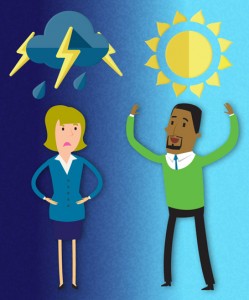2018 School Spending Survey Report
Teen Charm Offensive: Fostering Positive Attitudes About YA Programming
How to develop the essential “soft skills” to communicate with colleagues who may be less than enthusiastic about teens and young adult programming.
 Teen service librarians instinctively understand how to modulate their communication with young people. Facing a 16-year-old with five o’clock shadow, we can pitch a service while assessing the teen’s desired level of mediation, comfort level, and familiarity with the library. We must do the same when communicating with our colleagues, even those who are, shall we say, less than teen-friendly. We teen services people strive for equity of service and resources and get how non-traditional programs are library-appropriate. We smile when 25 teens walk in. But sometimes our colleagues don’t “get” us—and we certainly don’t get why they might view teens as problems. It’s difficult not to become angry with colleagues who treat teens with benign neglect or overt hostility. Right or wrong, it’s simply a fact: we teen services librarians often have to justify our activities in a way that other age-based services don’t. Some dreaded questions from colleagues: “What does that have to do with the library?” or, “Why do teens get to do/have that?” How we react in these situations is critical. We’re lead advocates for young adult services, and every interaction with colleagues reflects on what we do. Just as we display a professional attitude with the public, we must adopt one with coworkers. Teens aren’t born knowing how to use the library, and our colleagues aren’t born knowing how to serve young adults—or understand our innovative programming. We have to be good team players and diplomats at work—and help our colleagues understand the importance of what we do.
Teen service librarians instinctively understand how to modulate their communication with young people. Facing a 16-year-old with five o’clock shadow, we can pitch a service while assessing the teen’s desired level of mediation, comfort level, and familiarity with the library. We must do the same when communicating with our colleagues, even those who are, shall we say, less than teen-friendly. We teen services people strive for equity of service and resources and get how non-traditional programs are library-appropriate. We smile when 25 teens walk in. But sometimes our colleagues don’t “get” us—and we certainly don’t get why they might view teens as problems. It’s difficult not to become angry with colleagues who treat teens with benign neglect or overt hostility. Right or wrong, it’s simply a fact: we teen services librarians often have to justify our activities in a way that other age-based services don’t. Some dreaded questions from colleagues: “What does that have to do with the library?” or, “Why do teens get to do/have that?” How we react in these situations is critical. We’re lead advocates for young adult services, and every interaction with colleagues reflects on what we do. Just as we display a professional attitude with the public, we must adopt one with coworkers. Teens aren’t born knowing how to use the library, and our colleagues aren’t born knowing how to serve young adults—or understand our innovative programming. We have to be good team players and diplomats at work—and help our colleagues understand the importance of what we do. Soft skills
How? By employing soft skills to effectively communicate with colleagues—and make the library environment better for everyone. Soft skills are personality traits and habits—like friendliness, optimism, teamwork, critical thinking, and language—that characterize relationships within the workplace. They complement hard skills, which are occupational requirements: the things you have to know to do a particular job. Think of hard skills as what you do—and soft skills as how you do it. Here are some tips on building a positive in-house attitude towards teens and our services for them.Showcase positive examples
This is not the time to be shy or modest. Talk about how great the teens at your location are. Cite the incredible successes of the programs/activities they plan and how much they help the branch by volunteering “X” number of hours this month, this year. It can be beneficial to have a voice from outside the organization deliver your message. This could be the local media, a high school principal or teacher, a PTA group, parents, or other youth-serving agencies. If what’s going on in teen services is garnering kudos from community players, the shine reflects on the library as a whole. Managers understand this—capitalize on it.Put it in writing and Refine Talking Points
Know the teen services statistics—program attendance, YA circulation, number of teen volunteers and their hours— and create a monthly narrative report. Give it to your supervisor. He or she needs to know the numbers regarding teen patrons and see how your efforts contribute to overall service goals. You need to master these statistics, too, so that you can set goals and know if you’ve achieved them. Get a baseline of what is going on now, so you can measure outcomes of your service efforts monthly and annually. Numbers are great—but they don’t tell the whole story of your success. Be prepared with anecdotes about teen participation, how the library impacted a young person’s life, and how a parent complimented your service. Be ready with an elevator speech so that when a library board member, city councilor, or library administrator says “hello,” you are prepared to tell them about young adult programs.Put on your game face
When you walk into your branch library, be a ray of professional sunshine (seriously). Even if you aren’t feeling it, smile and be positive. It shows professionalism. Leading a perpetual charm offensive on behalf of teen services is important. You are nice, helpful, a team player, and hard to say “no” to because colleagues like you. You work hard at it. If you are all these things, your colleagues will have positive feelings towards you, and by extension, about teen services. Help colleagues with their service efforts. These efforts are leverage for when you need help, too.It’s never personal
One of the worst things you can do is alienate yourself from your coworkers—it’s stressful and bad for you on so many levels. While you aren’t at work to be friends with your colleagues, necessarily, you do need to maintain professionalism, kindness, and friendliness. Remember that the coworker who is mean to teens may be afraid of them. The manager who hates the idea of teen programming may have had bad experiences in the past. Your kindness and professionalism can help offset these negative feelings.Help colleagues better serve teens
We’ve all had the experience where we cringe, overhearing a colleague attempting to help a teen at the service desk, and doing a poor job. Your impulse might be to step in and take over—but you risk offending your colleague. Modeling outstanding teen customer service may not be enough—it may, frankly, be too subtle. Directly offering unsolicited tips to colleagues (e.g., during a reference interview or readers advisory) may help them. Saying to a colleague while still in the moment, “You know what I like to do when a teen has a question like that?”, is a gentle way of offering advice. Also, talk to your manager about offering training (“some tips”) during a staff meeting. Employing soft skills and diplomacy will make you a more effective teen services librarian and help keep the library atmosphere positive—improving things for everyone. Will it always be easy? No. Here’s some realism about the usefulness of kindness, from Sun Tsu’s Art of War: “The exercise of kindness in battle leads to victory.” This is the best kind of victory—one where everyone wins. Jennifer Velásquez (@jenVLSQZ) is a lecturer at the San José State University School of Information (CA) and coordinator of teen services for the San Antonio Public Library. A 2011 Library Journal Mover & Shaker, she is the recipient of the New York Times Librarian Award (2005). Her book, Real-World Teen Services, is available from ALA Editions.
Jennifer Velásquez (@jenVLSQZ) is a lecturer at the San José State University School of Information (CA) and coordinator of teen services for the San Antonio Public Library. A 2011 Library Journal Mover & Shaker, she is the recipient of the New York Times Librarian Award (2005). Her book, Real-World Teen Services, is available from ALA Editions. RELATED
RECOMMENDED
CAREERS
The job outlook in 2030: Librarians will be in demand
CAREERS
The job outlook in 2030: Librarians will be in demand
ALREADY A SUBSCRIBER? LOG IN
We are currently offering this content for free. Sign up now to activate your personal profile, where you can save articles for future viewing






Add Comment :-
Comment Policy:
Comment should not be empty !!!
Dee Dee Davenport
Great suggestions about how to showcase the positives!Posted : May 21, 2015 12:38